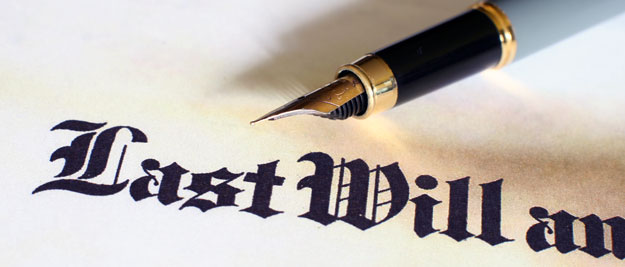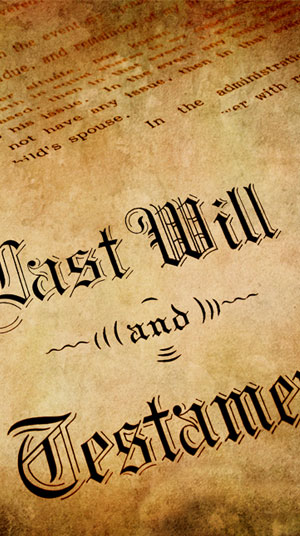Intestacy

What happens when a person dies without leaving a valid will?
When a person dies without a valid will or with a will that fails to dispose of all the property adequately, his or her estate is dealt with in accordance with the rules of intestacy. Intestacy is governed by Chapter 4 of the Succession Act 2006. It creates a hierarchy of inheritance for the intestate’s surviving family members.
Order of inheritance under Intestacy
Estates without a valid will
The following paragraphs outline the order in which the surviving relatives of an intestate are entitled to inherit a share of the estate. According to section 107 of Succession Act, a person is regarded as having survived the intestate if they live for at least 30 days after the intestate's death.
1. Spouse
For the purposes of the Succession Act, a “spouse” is anyone who was married or in a domestic partnership with the deceased immediately before his or her death. A “domestic partnership” is defined as a relationship between the deceased and another person that is a registered relationship or is a de facto relationship that has been in existence for a continuous period of two years or has resulted in the birth of a child.
Under section 111 of the Succession Act, if an intestate dies leaving a spouse and no issue, their entire estate is left to their spouse. Where an intestate dies leaving issue that all belong to the spouse, the spouse also receives the entire estate under section 112.
If an intestate dies leaving issue who do not belong to the spouse, then under section 113 of the Succession Act, the spouse receives the personal effects, a statutory legacy and half of the estate. The remaining half of the estate is left to the intestate’s issue.
Sections 122-124 of the Succession Act determine the rules for when more than one spouse is left. In simple terms the spouse’s entitlements as per sections 111-113 are to be shared equally amongst the spouses.

2. Children (issue)
Under the Succession Act, the term “issue” relates to the natural offspring of the intestate including children, grandchildren, great-grandchildren and so on. It also relates to any adopted offspring and any artificially inseminated offspring.
Where an intestate dies without a spouse but with children, section 127 of the Succession Act states that the estate is distributed equally amongst the surviving children. If any of those children die before inheriting their share of the estate, their share passes to any issue they may have until the issue are exhausted. If they die without any issue, their share is equally distributed amongst the intestate’s remaining children.
3. Parents
Section 128 of the Succession Act states that where an intestate dies without a spouse and without any issue, their parents are entitled to the estate. If only one parent survives the intestate, that parent receives the entire estate but if both parents survive the intestate, the parents receive equal shares of the estate.
4. Siblings (Brothers and Sisters)
If the intestate is not survived by a spouse, issue or parents, the siblings of the intestate are entitled to the estate in equal shares under section 129 of the Succession Act. If any of those siblings do not survive the intestate, their issue are entitled to their share of the estate until the issue are exhausted. If any of those siblings do not survive the intestate and do not leave any issue, their share is distributed equally amongst the remaining siblings. For the purposes of the Succession Act, no distinction is made between half brothers and sisters and full brothers and sisters.
5. Grandparents
Where an intestate dies without a spouse, issue, parents or siblings, their grandparents are entitled to their estate under section 130 of the Succession Act. Where there is only one surviving grandparent, the entire estate vests in that grandparent. Where there are two or more grandparents, the estate is divided into equal shares amongst them.
6. Aunts and Uncles
If an intestate leaves no spouse, no issue, no parents, no siblings and no grandparents, their aunts and uncles are entitled to their estate under section 131 of the Succession Act. Again there is no distinction between half aunts and uncles and full aunts and uncles. If any of the aunts and uncles do not survive the intestate, their share is passed to their children. However, their share cannot pass to more remote issue if those children do not survive the intestate either. In this case, the aunt’s or uncle’s share will revert back to the remaining aunts and uncles.
.jpg)
7. The state
Section 136 of the Succession Act entitles the State to the entire estate if the intestate is not survived by any eligible relatives under the rules of intestacy.
risks of leaving an estate without a valid will
You have no say in who inherits your estate assets
Despite the obvious risk of the State taking your whole estate if there are no relatives entitled to it, there are a number of other problems that come with not having a valid will:
Separated Couples
Under the rules of intestacy, a spouse takes priority over every other relative if an estate is not dealt with in a will. This is a problem where a married couple has separated but not formally divorced prior to the intestate’s death. Regardless of how long a couple has been separated, if they are still legally married, the law regards each person as a spouse to the other. As mentioned above, the spouse is entitled to the whole estate if there are no issue or if all the issue are of that spouse, and an equal share of the estate if there is another spouse or if there are issue that are not of that spouse.
Step Children, Adopted Children and Artificially Inseminated Children
Another problem that arises under the rules of intestacy is that step-children are not provided for at all. Although a parent may have raised a child for his or her whole life, the rules do not recognise them as an issue of an intestate unless they have been legally adopted.
Additionally, the biological children of parents who have given those children away for adoption are not provided for under the rules of intestacy. The rules deem these parents to have given away their interest in a child once they are adopted by other parents when this is not always the case.
Likewise, children who were born via surrogacy agreements are not provided for under the rules of intestacy. Unless these children are legally adopted after they are born, the rules consider the surrogacy agreement void.

Identifying relatives within a Class of Relatives
A very common problem that arises when a person dies intestate is the trouble with finding and proving all of the members of a certain class of relatives. For example, the brothers and sisters or the children and grandchildren of an intestate may not have proof of their relation to the intestate. This is especially problematic where there are multiple mothers or fathers to siblings and issue and when these people have been born overseas. While it is relatively simple to apply for a section 50 certificate to show all of the registered children of a person or a birth certificate to show the parents of a person in New South Wales, it may prove almost impossible to do in developing countries where records are not kept. A less simple option is DNA testing but this is also quite costly. Inevitably, some of these relatives may miss out on a share of the estate because there is not any proof they are related to the intestate.
Estrangements
Under the rules of intestacy, there is a real possibility that somebody the intestate is estranged from and does not want to benefit from the estate could inherit a share of their estate. For instance, a brother that the intestate had a falling out with, or a parent that abandoned the intestate when he or she was young, may be entitled to a share of the estate against the intestate’s wishes.
failing to draft a will is expensive
The cost of a will pales in significance to the huge cost burden of obtaining a grant of Letters of Administration
An application for Letters of Administration requires a great deal work compared with the repatively straight forward process of obtaining probate (probate requiring a valid will). For instance, a search for a will amongst legal firms, banks and the NSW Trustee and Guardianship can escalate the legal costs payable by the estate in order to satisfy the Supreme Court that there is in fact no will. Likewise, a search for birth certificates, marriage certificates, and associated documents may also escalate the legal costs payable by the estate beyond that of the fixed fees in order to prove the identity of a member from a class of relatives.The cost of having a will drafted by a solicitor is small, whereas the costs of failing to have a will is likely to add thousands of dollars in legal fees when it comes time to administer an intestate estate.
At Bainbridge Legal we are able to quickly and efficiently draft a will that expresses your wishes and instructions. We understand that you work hard for your possessions and you should have the opportunity to decide who will benefit from them. To protect your estate, contact our office to arrange an appointment with one of our practitioners to draft your will.